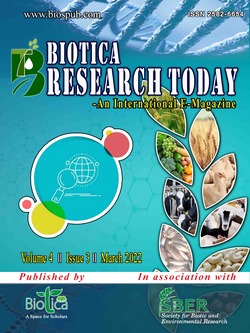
Regenerative Agriculture - Turning Dead Dirt into Living Soil
Prameet Soujanya Satapathy
School of Agriculture, GIET University, Gunupur, Rayagada, Odisha (765 022), India
Rajeswari Das*
Dept. of Soil Science, School of Agriculture, GIET University, Gunupur, Rayagada, Odisha (765 022), India
DOI: NIL
Keywords: Climate change, Conventional agriculture, Organic matter, Soil
Abstract
The increased agricultural intensification to meet the hunger of over growing population had led to excessive application of chemical fertilisers and agro-chemicals which on the other hand have led to the desertification of soil. Regenerative agriculture is the new hope towards the conversion of the dead dirt soil to lively and productive soil. Regenerative agriculture isn’t a completely new way of farming, but more of these practices must be put into play as the current and future agriculture demands site-suited smarter and resilient technologies to attain sustainable yield and combat climate change with reduced environmental footprints.
Downloads
not found
Reference
Godfray, H.C.J., Beddington, J.R., Crute, I.R., Haddad, L., Lawrence, D., Muir, J.F., Pretty, J., Robinson, S., Thomas, S.M., Toulmin, C., 2010. Food security: the challenge of feeding 9 billion people. Science 327(5967), 812-818.
Smith, P., Gregory, P.J., 2013. Climate change and sustainable food production. Proceedings of the Nutrition Society 72(1), 21-28.
